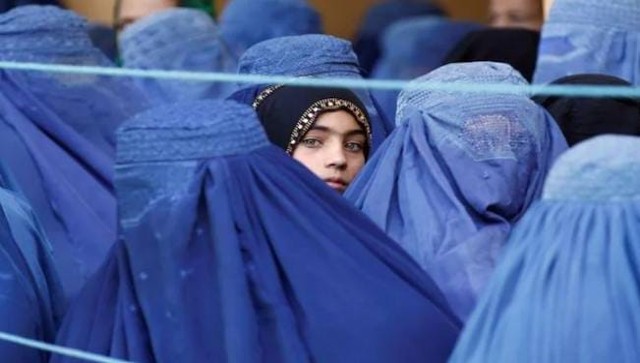As the situation of women continues to deteriorate in Afghanistan and Iran, a diverse group of female leaders, activists and legal practitioners in both the countries have launched a campaign calling on states to recognise gender apartheid as a crime under international as well as national law. The campaign titled— End Gender Apartheid Today—began on 8 March, on the International Women’s Day to raise awareness and to address the reality of women and girls who live under the Islamic Republic of Iran and Taliban in Afghanistan, both extremist regimes that are constantly bringing out policies to dehumanise and downgrade the status of women within their societies. The word apartheid has been derived from the Afrikaans word “apart” and was first used to describe the institutional racial discrimination of black people in South Africa during the second half of the 20th century. The Rome Statue therefore, defines apartheid as “inhumane acts … committed in the context of an institutionalised regime of systematic oppression and domination by one racial group over any other racial group or groups and committed with the intention of maintaining that regime.” The crime of apartheid—under the international law—however, only applies to racial hierarchies, excluding hierarchies that are based on gender. And while over the past recent years, the topic of gender apartheid has been receiving some attention, it has not yet been recognised as an international crime. But what is gender apartheid after all? There exists no legal definition for the term gender apartheid but Karima Bennoune, the Lewis M. Simes Professor of Law at the University of Michigan Law School has described gender apartheid as “a system of governance, based on laws and/or policies, which imposes systematic segregation of women and men and may also systematically exclude women from public spaces and spheres.” Thus, to put it simply, gender apartheid is the social, economic or sexual discrimination of individuals based on their gender identities or sex. Inferring from this, one can undoubtedly say that the on-going subjugation of women in Afghanistan and Iran—which goes far beyond the components of discrimination—with the administrations constantly trying to perpetuate a more extreme, systematic and structural war against women, these cases tantamount to gender apartheid. Women in both these countries are in fact denied the right to life and liberty as well as basic human rights and freedoms, which are considered as the crime of apartheid as per Article II of the United Nations’ Apartheid Convention (1973). For instance, in Afghanistan, the Taliban—despite promising a more moderate rule that allows women to study and work—turned around the clock shortly after re-establishing its power by banning women from education, prohibiting them from working outside their homes, forcing them to follow the prescribed dress code, preventing them to travel long distances without a male chaperone, etc; gradually erasing them from the public domain. Similarly, in Iran, women are currently banned from various fields of study, sporting events as well as from obtaining a passport or travelling out of the country without the permission of their husbands. Meanwhile, in an attempt to shut down girls’ schools, reports of poisoning in Iranian schools continue to rise with more than 1000 students, mostly girls, falling ill over the past three months. Systematic oppression and subjugation that make up apartheid are thus, very well present in Iran and Afghanistan today, necessitating the expansion of the legal definition of apartheid under international as well as national laws to include gender apartheid. And there exists multiple arguments in favour of this approach. To begin with, the incorporation of apartheid within the international legal frameworks helped end racial discrimination and emerge as a catalyst of change in South Africa. Similarly, the adoption of the apartheid label to describe what is happening in Afghanistan and Iran can possibly prove to be a catalyst for bringing about a change in these countries, improve the situation of women and ultimately end the prevailing systems of gender apartheid. In addition, there currently exists a major accountability gap at the global stage, which is allowing for the grave violations and abuses against women in Afghanistan and Iran. And thus, the expansion of the moral, political and legal tools through the inclusion of gender apartheid as a crime against humanity is the best possible way for mobilising and ensuring the legitimacy, credibility and effectiveness of the international legal response. Besides, it can create pathways to justice and provide hope for a better future to the Afghan and Iranian women, upholding their rights to equality and freedom. Gender apartheid is very real, it is deliberate and it is a systematic problem, which is crushing the aspirations and depriving millions of women of dreams, education, health, employment opportunities and freedom. It is an assault on human dignity. There is therefore, an urgent need to classify gender apartheid as a crime under international law, which would be more effective and radical in countering the rampant violations of women’s rights in Afghanistan and Iran. The writer is a Visiting Fellow with the Observer Research Foundation. Some of her works have appeared in South China Morning Post, The Hindu, Firstpost, Hindustan Times, The Diplomat, The Toronto Star, among several others. She tweets at @akankshakhullar. Views are personal. Read all the Latest News , Trending News , Cricket News , Bollywood News , India News and Entertainment News here. Follow us on Facebook, Twitter and Instagram.
There currently exists a major accountability gap at the global stage, which is allowing for the grave violations and abuses against women in Afghanistan and Iran
Advertisement
End of Article


)

)
)
)
)
)
)
)
)



